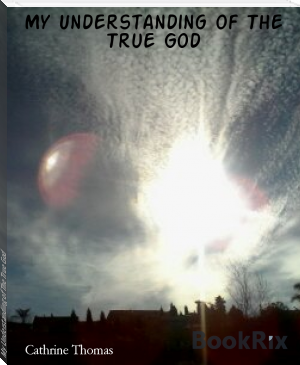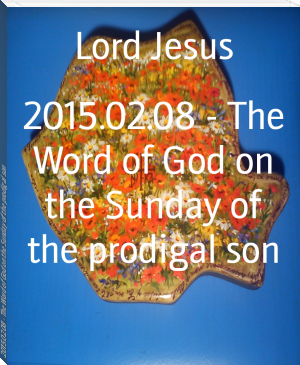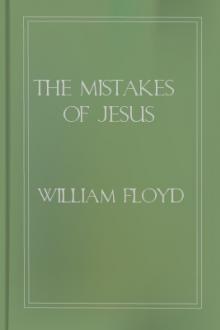My Understanding of The True God, Cathrine Thomas [mobi reader .TXT] 📗

- Author: Cathrine Thomas
Book online «My Understanding of The True God, Cathrine Thomas [mobi reader .TXT] 📗». Author Cathrine Thomas
4. But with righteousness shall he judge the poor, and decide with equity for the meek of the land; and he shall smite the land with the rod of his mouth, and with the breath of his lips shall he slay the wicked.
(The word “righteousness” is connected to “the fear of the Lord”: it means doing the right things, keeping to God’s law. It is about how to deal with the poor and the needy, to respect “the meek”, those who do not seek position and power. But it also requires action against wickedness and the power of speech against what is wrong.)
5. And righteousness shall be the girdle of his loins, and faithfulness the girdle of his reins.
(The word “girdle” means a belt, and it is the control over the “loins” and the “reins” of what he has to do: “righteousness” means that he will be controlled in everything he does by the Law of God.)
10. And it shall come to pass in that day, that the root of Jesse, that standeth for an ensign of the peoples, unto him shall the nations seek; and his resting-place shall be glorious.
(The “root of Jesse” will be “an ensign of the peoples”, i.e. a banner or a flag that all “peoples” will admire and appreciate, and all nations will rally to him as their hero. The words “his resting-place shall be glorious” reminds me of how so many world leaders were present at Nelson Mandela’s funeral. The words “his resting place” could also mean his land, our beautiful country.)
I am reminded of Isaiah 52:15:
So shall he startle many nations, kings shall shut their mouths because of him; for that which had not been told them shall they see, and that which they had not heard shall they perceive.
(The word “startle” suggests that many nations will be amazed by or marvel at him. Kings will remain silent because of their respect for him and because they know they are inferior to him, and they will see in him what they had never before learnt and they will become aware of (“perceive”) what they had never known before. To whom has the whole world shown this kind of respect? When Nelson Mandela spoke, everyone listened.)
For more information about the Lord’s Servant, let us turn to Isaiah 49:
1. Listen, O isles, unto me, and hearken, ye peoples, from far: the LORD hath called me from the womb, from the bowels of my mother hath He made mention of my name;
2. And He hath made my mouth like a sharp sword, in the shadow of His hand hath He hid me; and He hath made me a polished shaft, in His quiver hath He concealed me;
3. And He said unto me: 'Thou art My servant, Israel, in whom I will be glorified.'
4. But I said: 'I have laboured in vain, I have spent my strength for nought and vanity; yet surely my right is with the LORD, and my recompense with my God.'
(Nelson Mandela on Robben Island must have thought he had “laboured in vain”, and, when we look at what is happening in South Africa today, perhaps we might think that he “laboured in vain”.)
5. And now saith the LORD that formed me from the womb to be His servant, to bring Jacob back to Him, and that Israel be gathered unto Him -- for I am honourable in the eyes of the LORD, and my God is become my strength –
(Anyone who is “honourable in the eyes of the Lord” will say, “My God is become my strength”.)
6. Yea, He saith: 'It is too light a thing that thou shouldest be My servant to raise up the tribes of Jacob, and to restore the offspring of Israel; I will also give thee for a light of the nations, that My salvation may be unto the end of the earth.'
(Despite the fact that the Lord’s Servant may have thought he had laboured in vain, the Lord assures him that he will be “a light” for all nations and that the Lord’s salvation “may be unto the end of the earth”.)
7. Thus saith the LORD, the Redeemer of Israel, his Holy One, to him who is despised of men, to him who is abhorred of nations, to a servant of rulers: kings shall see and arise, princes, and they shall prostrate themselves; because of the LORD that is faithful, even the Holy One of Israel, who hath chosen thee.
(Nelson Mandela was “despised of men” and “abhorred of nations”, but kings and princes later prostrated themselves before him.)
8. Thus saith the LORD: In an acceptable time have I answered thee, and in a day of salvation have I helped thee; and I will preserve thee, and give thee for a covenant of the people, to raise up the land, to cause to inherit the desolate heritages;
(Has he not raised “up the land”? Has he not caused “to inherit the desolate heritages”?)
9. Saying to the prisoners: 'Go forth'; to them that are in darkness: 'Show yourselves'; they shall feed in the ways, and in all high hills shall be their pasture;
(Did he not release prisoners and people “in darkness” and try to “feed” the hungry?)
10. They shall not hunger nor thirst, neither shall the heat nor sun smite them; for He that hath compassion on them will lead them, even by the springs of water will He guide them.
11. And I will make all My mountains a way, and My highways shall be raised on high.
(Notice that it is the Lord who does this, not the Servant of the Lord.)
12. Behold, these shall come from far; and, lo, these from the north and from the west, and these from the land of Sinim.
(The suggestion here is that the people who will “come from far … from the north and from the west” will be reunited. The “land of Sinim” is an unknown land; some scholars think it may refer to the land of Syene in the South of Egypt, where some Jewish people lived. We might think the word has to do with “sin”, but the English word “sin” does not come from Hebrew.)
13. Sing, O heavens, and be joyful, O earth, and break forth into singing, O mountains; for the LORD hath comforted His people, and hath compassion upon His afflicted.
14. But Zion said: 'The LORD hath forsaken me, and the Lord hath forgotten me.'
(“Zion” usually refers to Jerusalem, but can also refer to the Jewish people. Despite the Lord’s comfort and compassion, Zion complained that the Lord had “forsaken” and “forgotten” Jerusalem or the people of Zion.)
15. Can a woman forget her sucking child, that she should not have compassion on the son of her womb? Yea, these may forget, yet will not I forget thee.
(The Lord responds to Zion’s complaint that it had been forsaken and forgotten by asking how can a woman forget her breast-feeding child and “not have compassion on the son of her womb”. The Lord answers that, although “these may forget” (i.e. some women may forget their children), “yet will not I forget thee” (Zion, my children. Some women may be so excited about their new children that they forget to feed their new-born children, but God does not forget his children.)
16. Behold, I have graven thee upon the palms of My hands; thy walls are continually before Me.
(The Lord assures Zion that He and Zion are so close to each other that He has “graven” Zion “upon the palms” of His hands and he will rebuild the walls of Zion (Jerusalem).)
17. Thy children make haste; thy destroyers and they that made thee waste shall go forth from thee.
(The children of Zion and of the Lord must hurry to work on the reconstruction of Jerusalem. The Lord assures them that their “destroyers” will leave Zion.)
18. Lift up thine eyes round about, and behold: all these gather themselves together, and come to thee. As I live, saith the LORD, thou shalt surely clothe thee with them all as with an ornament, and gird thyself with them, like a bride.
(The words, “all these gather themselves together, and come to thee”, remind me of the coming together of all South Africans in Nelson Mandela’s democratic South Africa.)
19. For thy waste and thy desolate places and thy land that hath been destroyed--surely now shalt thou be too strait for the inhabitants, and they that swallowed thee up shall be far away.
(This, too, reminds me of the way that Apartheid was suddenly “far away”.)
20. The children of thy bereavement shall yet say in thine ears: 'The place is too strait for me; give place to me that I may dwell.'
(There was much “bereavement” during Apartheid, and many people have asked for “place” that they “may dwell’ in our land.)
21. Then shalt thou say in thy heart: 'Who hath begotten me these, seeing I have been bereaved of my children, and am solitary, an exile, and wandering to and fro? And who hath brought up these? Behold, I was left alone; these, where were they?'
(Many people were “bereaved” of their children, and there were many exiles “wandering to and fro”.)
22. Thus saith the Lord GOD: Behold, I will lift up My hand to the nations, and set up Mine ensign to the peoples, and they shall bring thy sons in their bosom, and thy daughters shall be carried upon their shoulders.
(The Lord has lifted His “hand to the nations” and He has set His “ensign to the peoples” trough the dramatic change in South Africa.)
23. And kings shall be thy foster-fathers, and their queens thy nursing mothers; they shall bow down to thee with their face to the earth, and lick the dust of thy feet; and thou shalt know that I am the LORD, for they shall not be ashamed that wait for Me.
(The words, “kings shall be thy foster-fathers, and their queens thy nursing mothers” remind me of how many rich and famous white people in our land have adopted children that were previously their enemies.)
24. Shall the prey be taken from the mighty, or the captives of the victorious be delivered?
(The answer to this question is, “Yes”: “the prey” has been “taken from the mighty”, and “the captives of the victorious” have been “delivered”.)
25 But thus saith the LORD: Even the captives of the mighty shall be taken away, and the prey of the terrible shall be delivered; and I will contend with him that contendeth with thee, and I will save thy children.
(The Lord has definitely contended with those who contended with the people of South Africa, and His children have been saved.)
26. And I will feed them that oppress thee with their own flesh; and they shall be drunken with their own blood, as with sweet wine; and all flesh shall know that I the LORD am thy Saviour, and thy Redeemer, the Mighty One of Jacob.
(Do we “know” that the Lord is our “Saviour” and “Redeemer, the Mighty One of Jacob”?)
The last Book of the Old Testament, Malachi, tells us in the last chapter 4:4: “Remember the Law of Moses, My servant, which I commanded him in Horeb for all Israel, with the statutes and judgements.” Our Saviour and our Redeemer, the Mighty One of Jacob, tells us that we must remember and observe the Law of Moses.
Do we?
Another question: What is Nelson Mandela’s real name?
His name is Rolihlahla. What is the isiXhosa meaning? It means “pulling the





Comments (0)